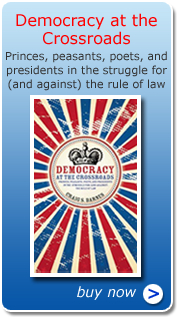When I was a boy, on days after we came in from fixing fence or putting up hay, my father was accustomed to lead conversations at the dinner table. He might talk about paying some rancher for a horse, paying what we said we would pay. My father thought it was possible to be honest and that we three boys ought to try for that as hard as we could.
One day in our little school house I read about Oliver Wendell Holmes who wrote a 19th century book called the Autocrat of the Breakfast Table. Holmes at the breakfast table sounded like my father at the dinner table. Years later, when my father died I found Holmes’ Autocrat waiting for me in a cabinet of treasures.
On page 14 Homes had said, "You can hire logic in the shape of a lawyer to prove anything that you want to prove. You can buy treatises to show that Napoleon never lived’ [but] I value a man mainly for his primary relations with truth, as I understand truth, ’not for any secondary artifice in handling his ideas."
My father in the last century and Holmes in the century before that had both thought that the American experiment would be to see whether men could live with truth and whether our government could be based upon decency and integrity rather than bluster and raw power.
Then this year the president of the United States manufactured a case for war against Iraq that was not based primarily on truth. A decision made with his staff in October 2001 was claimed to be not decided when Mr. Bush went to the United Nations in 2002, and again when he went to the Congress and when he went to the American people in 2003. A decision claimed to be made upon the basis of hard evidence of weapons of mass destruction was, instead, made upon outdated reports, second hand reports, and forged reports. A decision which could not be ratified by the professional intelligence agencies was instead ratified by an Office of Special Plans created for the purpose. The president said "Either Saddam will disarm or we will disarm him." What he didn’t say was that he did not actually know where Saddam’s weapons were, who was making them, how many there might be, or what they might do. He did not know who did know but he could imagine someone who did know and he would go to war based upon this imagination. He said he was sure of the truth. In fact, to the contrary, he knew that he did not know whether what he said was true or made up. In a court of law, claiming to speak truth when you know that you do not know is called fraud. What the president and the Defense Secretary did, if done by any of the rest of us, would be punishable. Any lawyer in the land knows this law; the president’s staff must therefore also know. They must have decided that the law did not apply to them.
Now comes a report that Deputy Defense Secretary Paul Wolfowitz, the primary architect of the Iraq war, took his doctorate under Leo Strauss a professor at the University of Chicago who came to this country in 1938 from Germany. Coming out of Hitler’s chaos, Strauss taught and wrote extensively that leaders may use lies to calm the people and stay in power. His student, Mr. Wolfowitz, has now admitted to Vanity Fair that the claim of weapons of mass destruction was a convenience, necessary to get consent from others, alleged to be absolutely true, but in fact a supposition. It was what would sell which is not the same as what was true.
Some Americans think that the adhesive which holds any community together, the very cement of culture, the bond which allows people to live and work together is their attempt to be authentic, to be reliable and to tell the truth as best as they can see it. What Mr. Wolfowitz, Mr. Rumsfeld and Mr. Bush did therefore, manufacturing evidence to keep us all in line, is to some of us fundamentally un-American, a violation of the very standards upon which community is based.
That is what we learned in the wheat fields of the west when I was a boy, and that is what Holmes wrote in the 19th century and it would have been more true to our heritage if we had stayed on that path. Instead, all the world now knows that the American government was saying what ever it wanted to say, for effect, but not for the truth of it, and we will have some work to do to get our reputation back.
